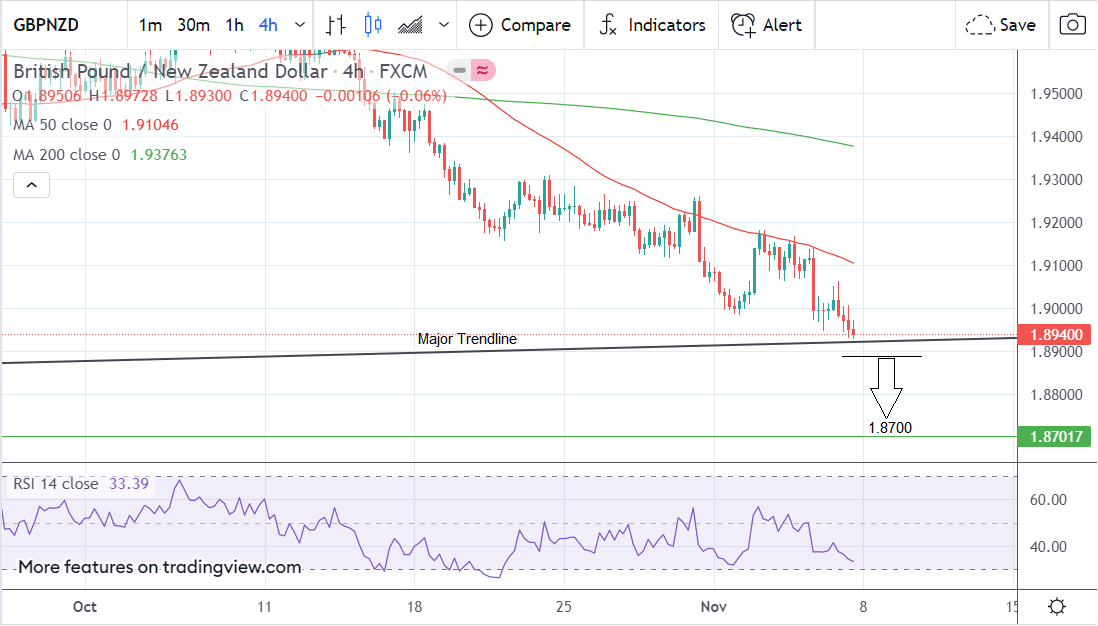GBP/NZD Rate Week Ahead Forecast: A Bounce then a Fall?
- Written by: Albert Townsend
-
- GBP/NZD in short-term downtrend
- Has now reached a major long-term trendline
- There may be a near-term bounce off this level
- But there are no signs of the bear trend reversing

Image © Adobe Stock
The Pound to New Zealand Dollar exchange rate is trading at around 1.8940 at the time of writing after falling 0.71% in the week before.
Studies of the charts suggest the pair could stall at this level but that it will eventually continue falling in line with the dominant downtrend.
The 4 hour chart shows the pair falling in a descending series of lower highs and lower lows which has just reached support at a major trendline drawn from the November 2016 lows.
There is a good chance it will bounce off the trendline in a short-term recovery, but that the dominant downtrend will eventually reassert itself and continue pushing the pair lower.
Penetration of the trendline and a clear daily close below, would be necessary for confirmation of more downside.
Assuming those conditions are met, the pair is expected to extend lower to a near-term initial target at 1.8700, calculated by extrapolating the last move prior to the trendline break lower.
The 4hr chart is used to determine the short-term outlook, which includes the coming week or next 5 days:
Above: GBP/NZD four-hour chart.
- GBP/NZD reference rates at publication:
Spot: 1.883 - High street bank rates (indicative band): 1.8222-1.8354
- Payment specialist rates (indicative band): 1.8713-1.8789
- Find out about specialist rates, here
- Or, set up an exchange rate alert, here
The daily chart shows the pair close to completing a measured move pattern that started at the August 19 highs.
Measured moves are symmetrical 3-wave zig-zags, where the final 3rd wave down (C) is usually of a similar length to the first wave (A), or fibonacci extension thereof.
The pattern on GBP/NZD has now probably finished since wave C is of a similar length to wave A.
The pair has also touched down at the level of the major trendline. The fact that it has both completed a price pattern and found support at a major trendline suggests there is a high likelihood of a bounce - the bullish RSI signal after it exited oversold on Nov 1 is a further sign such a rebound may be on the cards.
However, it is likely to be short-lived given the overall trend lower, and once it has finished, the bear trend will probably continue, pushing the exchange rate down through the trendline and lower.
A probable downside target for the pair in the medium term - or next week to month - for which the daily chart is used, is 1.8510.
Above: Daily GBP/NZD chart.
Secure a retail exchange rate that is between 3-5% stronger than offered by leading banks, learn more.
The weekly chart is showing much the same thing as the daily only over the longer-term view, which includes the next few months.
The pair has declined for four straight weeks in a row. It has successfully broken below both the 50 and 200-week moving averages; now it has finally reached a key long-term trendline.
It remains to be seen whether it can break through the trendline and continue south.
If it can, it will probably fall to a target at 1.8130 eventually, albeit in a step progression.
The New Zealand Dollar: What to Watch
There are no tier one releases for the Kiwi Dollar in the week ahead but on Monday, November 8, a respected indicator of retail sales - Electronic Card Retail Sales - will be released at 21.45 GMT.
In the previous month of October, electronic card spending rose 0.9% month-on-month, but it was relatively unchanged in core retail industries.
One key positive was that spending on durable goods rose 17.5%, suggesting consumers felt confident enough to splash out on big ticket items.
Spending on Apparel, however, showed the greatest fall of any group, declining 10.4%.
A substantially higher result may lend support to the New Zealand Dollar, although it would have to be a big surprise leap to push the exchange rate higher - and vice versa for a miss, given the relatively low priority given to this data point.

